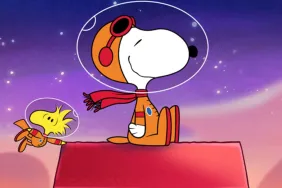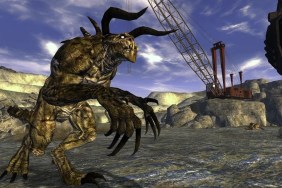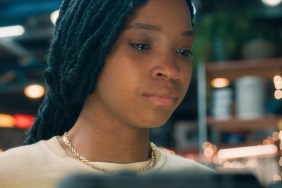This week, director James Gray (The Yards, We Own the Night) is back with his fourth movie, Two Lovers, a quieter character drama that reunites him with actor Joaquin Phoenix for the third time.
This time, Phoenix plays Leonard Kraditor, a troubled soul who had been institutionalized after a suicide attempt, but who is back in Brighton Beach, Brooklyn, living with his parents, and who is caught between two very different women. Vinessa Shaw’s Sandra is the Jewish daughter of his father’s business partner who is immediately attracted to Leonard, but he has his heart set on his beautiful new neighbor Michelle (Gwyneth Paltrow), who has been going through her own turbulent relationship with a married man in Manhattan.
Leonard is a very different character from the one Phoenix has played in other movies, let alone Gray’s, probably being his most complex role since playing Johnny Cash in Walk the Line. Leonard is awkward and nerdy one minute, but also has a way of winning these seemingly unattainable women over with his charm. Certainly anyone who has ever experienced unrequited love or unreturned affection will be able to connect with this heartbreaking and personal (although not autobiographical) new film from Gray.
Unfortunately, the movie and Phoenix’s amazing performance in it has become hopelessly overshadowed by his highly-publicized decision to give up acting and become a hip-hop artist, something that became the focus for a roundtable interview ComingSoon.net attended yesterday where few journalists bothered to ask questions about the movie. Afterwards, Joaquin’s documentarian (and brother-in-law) Casey Affleck sat down with the journalists for a focus group about the roundtable experience, as well as giving an impassioned speech supporting Joaquin’s right to change careers and chiding people for not taking it seriously. (For what it’s worth, this writer, who has spent many years in the music business working with recording artists, believes without a shadow of a doubt that Phoenix’s intentions are pure, just that he’s going about it the wrong way by making his career decision so public.)
Regardless of that circus, we’re here to talk about James Gray’s movie and thankfully, ComingSoon.net had a chance to sit down with director Gray afterwards to talk solely about his new film.
ComingSoon.net: This is obviously very different from your previous two movies even though there are some familiar elements. Had you thought about doing this a long time ago or was this something that came up within the last couple of years?
James Gray: Well, what tends to happen is… how can I put this? When you make a film it almost never… I wish the process were, “I got a lightbolt of an idea and I wrote the whole thing in a week.” Now I know that Paul Schrader did that for “Taxi Driver” which I have read in script form and will tell you that flat-out is the best screenplay I have ever read, where the vivid nature of it literally explodes off the page. The guy for me is a genius if he did nothing else, and he has, but that alone. It doesn’t work for me that way. For me, I get a part of an idea here and a little bit of an idea there, and then finally it accumulates into a movie. It got its foundation really (when) I got my wife pregnant, intentionally, and we had to go get genetic testing. My wife is not Jewish. I am an Ashkenazi Jew and there are a whole host of genetic disorders that only Ashkenazi Jews have. I don’t know if you know this, but 16 or 17 disorders that we carry the gene for. This is a pretty interesting thing because Ashkenazi Jews are essentially descended from the same four women apparently, so we have essentially inbreeding diseases or disorders. I was tested positive as a carrier for three diseases. My wife was negative for all of them and I thought, “Well, that’s kind of weird.” I asked the genetic counselor, “What happens if both couples are (positive) to carry the gene?” and she said, “Well, I have some Jewish couples that come in here and let’s say they both have the Tay-Sachs gene, then their children have a very good chance of not making it past the age of four.” I thought, “My God, what a tragedy that is,” and she said, “Yes, it has destroyed relationships.” I thought, “Interesting.” So I sort of wrote that down and put it in a drawer.

CS: How long ago was that?
Gray: Well, that was my first son, when we got pregnant with our first child, so that would have been about September of ’06, because he’s three. So something like three and a half years ago. So there was that, but I couldn’t think of how to make a movie about that because it’s so like maudlin: a guy walks around and goes, (fake cries) “I have the gene!!” You know what I mean? It’s terrible. So I thought, “Well, I don’t know how to use this, but I’ll put it in a drawer somewhere.” Then I had reread–pulled it off the shelf for a little light reading–Dostoyevsky’s “White Nights” which I thought was a beautiful novella of great tenderness about a person who tried to deal with love, but was ill-equipped and didn’t have all the tools to live really. Dostoyevsky wrote before all these aids of major pharmaceutical companies that could help us out of our depression and our troubles. I thought, “What a beautiful and tender thing and what a great way to make a love story because when we’re in love, we’re all kind of insane.” So I combined the two really and I used the back story of Tay-Sachs to form a kind of heartbreak for the character, then I used the Dostoyevsky as a kind of a springboard.
CS: Having worked with Ric Menello on this script and with both him and Joaquin on “We Own the Night,” was this idea kind of floating around the set before you all decided to make it?
Gray: Well, I had written “Two Lovers” before we started shooting “We Own the Night.” I was waiting for “We Own the Night” to get made and, Mark Wahlberg had like 72 movies he had committed to. With stars, you have to kind of make sure that the timing is right because they’re booked a lot of times. I was waiting for him to become available and I didn’t want to make the movie without him, and in the time I had, I wrote this with Ric Menello on the phone really. It really only took about four weeks once we had the outline. It was a very quick process and that was completed about a month and a half before “We Own the Night” started pre-production. On the set of “We Own the Night” I said to Joaquin, “Look, I’ve written this little picture that I wrote for you,” which is true. I said to him, “I won’t make it unless you do it… which is not to put pressure on you, but it’s just, it’ll never get made. I think it’s something you need to do.” And he said, “Okay.”
CS: Leonard is such a different character even for Joaquin. Was it hard convincing him or did you just need to show him the script and it was something he wanted to do?
Gray: That’s a good question. I’m trying to remember back. My memory is that he read the script and kinda didn’t love it. He was like, “I dunno. What do I do with this guy? What is this?” And then about a month into production on “We Own the Night” he said, “You want to do another movie? You want to do that guy? You want to do that guy? You want me to do Kraditor for ya?” I said, “Yeah, I think that’ll be good,” and he said, “Alright, maybe I’ll do that.” I guess because he started to enjoy the process again and working with me, and he sorta said, “Okay, I’ll do this other movie.”
CS: Was this movie hard to get financed in general or was it much easier when Joaquin came on board?
Gray: It wasn’t, because the film was small and “We Own the Night” made money for the financiers so they were anxious to make another picture with me. The movie didn’t cost very much so they kinda said, “Here’s 11 million dollars. You have final cut, complete creative control, go make whatever you want.” And that was the way that it panned out.
CS: Even though this was a completely different movie from that one?
Gray: It was very easy because of Joaquin and Gwyneth and the budget was small. It really wasn’t a difficult thing I must say.
CS: How was this experience compared to previous ones considering the fact that you did have full creative control?
Gray: It was so great. I mean, all of the films I have made are mine with the exception of certain elements of “The Yards.” The ending of “The Yards” which I finally did later get to put out as a director’s cut DVD and I’m grateful to Steven Soderbergh for that, but I was really quite liberated. I know that I’ve said this, but you want to know that if something that you did is no good, that it’s your fault. If it’s somebody else’s fault, the picture doesn’t say, “Written and directed by James Gray. Things that suck in it by studio executive who gave you that note.” Your name is up there, and you take the credit and the blame. So, knowing that, I just tried to give it all that I had and it was a very liberating experience and the set was a very happy place as a consequence.

CS: I want to talk about developing Leonard as a character. Like I said, this is a very different character for Joaquin, since we know that he’s tried to kill himself–we actually see that–so he’s damaged and troubled, but he also has this way with the ladies that’s amazing. Did you feel that before his troubles, he was a real charmer or a ladies’ man?
Gray: Oh, absolutely. I mean, he even says it in the movie. He says, “Oh, I had a crew. I used to have a crew, you know man?” and the fact that he’s sort of a good dancer. He’s not a great dancer, but he’s sorta good enough that we’re embarrassed watching him, but you can see how the girls might like it. We had always talked about that–that we were not anxious to make the typical nerd movie. What we were anxious to do was make a movie in which the person might have had real potential at one point and because of this heartbreak and because of his own problems, never really got it together and had to move back into the house. We just felt that was a powerful character because it’s hard to empathize with the nerd because the nerd is just a loser and a putz, and you never ever felt good about that guy to begin with. Someone who feels like they tried and their heart was broken to me it feels like it has a kind of a pathos about it, you know?
CS: I never got this before talking to you, but Leonard in a way reminds me of Dustin Hoffman’s character from “The Graduate” – he’s not completely together but he has his charm that allows you to root for him.
Gray: Yes, yes, yes, yes, well absolutely. Joaquin and I, that’s our taste. It’s sort of ’70s movies, and we are very seriously in love with the kind of open-ended and complex characterizations. People that are troubled and fighting a certain kind of melancholy. I mean, I don’t know, I wonder what Joaquin… did you interview Joaquin?
CS: Earlier, but he didn’t really talk about the movie very much; he just talked about all this other stuff. (Gray gives an exasperated look, and visibly rolls his eyes.) I wish I could capture that look. Believe me, I felt the same way.
Gray: His work is brilliant in it. It pisses me off. It’s like, you can do that, fine. You’re out of acting, fine, but you’re going out on this note. I think he’s going out on a high note. Look, I’m biased, I made the film, but I think his work is just fantastic in it and it just bothers me. Anyway, I’m sorry.
CS: On the other hand, this will certainly be a case where his performance really speaks for itself.
Gray: True enough.
CS: Personally, I wanted to know how he got into the head of the character, but there was no way you could get a question in about the movie, so what can you do? I want to ask whether you feel this movie is a love story. You have a movie called “Two Lovers” coming out right before Valentine’s Day so you assume it’s a love story, but both these relationships aren’t great. He has one woman who is obviously really into him and he’s got another woman who he’s chasing after while she’s fixated on someone else. Did you consider it a love story when you were making it or any time during the process?
Gray: Here’s what I thought about making it. That’s a great question; I’ve never been asked that actually. I feel like what I really wanted to do was to make a film not about love, but desire. What we desire and the fickle nature of desire and how desire is connected to fetish. By fetish I don’t mean S & M. The example I like to give is that I met my wife at a party and if she had walked into the room dressed differently or with too much makeup I might never have talked to her. So really we do find people through superficial means, because all of our desire is based on projection. There was a French poem that I came across which really summed it up. It was so great, it was in a book on lectures on psychoanalysis that I was reading and the poem was by a guy named Louis Aragon who was a French surrealist poet from the ’30s and it’s considerably more poetic in the French, but it says, “In vain your image comes to meet me. Where I am the only one who finds it. On the wall of my gaze you can find only your dreamed of shadow. I am that wretch comparable with…” it goes on. The point being, “In vain your image comes to meet me,” that essentially (means), “What I love about you or what I think I love is merely my projection.” And that does not mean that my love is fake because for me it’s real so it’s real, but you looking at it with distance can sense the absurdity of it.

CS: It’s funny because both he and Sandra kind of do that.
Gray: Everybody’s doing it, right? I mean, Michelle is like, “He’s really successful, he’s rich” and she’s projecting everything onto him, “You like opera?” “Oh, I love opera.” But the whole thing from everybody is projecting, and you’re quite right. People have said to me, “Why does she like Leonard?” and I’m like well my own experience has been sometimes there are these people that have really have a sort of messiah complex or something. They want to help or save people and I think clearly she’s the type of person that just wants to save him, and she says it, “I want to take care of you. You’re different. You’re not like the other guys.” So that was really the idea of it.
CS: You always hear how guys are always looking for a replacement for their mother, and here’s Sandra who really is like that. Most guys would just grab and hold onto that, but he seems to be looking for something that’s completely opposite.
Gray: Right, which by the way is part of the fetish, right? People have said, “Oh, well is Vinessa Shaw too attractive?” and I always found that slightly sort of a bigoted response, if you may allow me that, because the idea of the Jewish girl has to be like some homely like (in a cliché Jewish voice), “Hello, how are you?” I had wanted Vinessa because she felt very earthy and lovely, but not the same fetish as Gwyneth. That they are different for different tastes and that Leonard was blind to Vinessa’s loveliness for reasons entirely connected to social class, and how she’s connected to the neighborhood and so forth.
CS: Were any scenes really hard to shoot? As I watched the movie, even the things on the roof with Michelle and Leonard seemed like it could have been difficult. How hard was making this movie on your actors?
Gray: Well, it was difficult because there were no sets. It was all on location, so particularly the two scenes on the roof that you mentioned with Gwyneth and with Joaquin. One of the scenes is one shot and it’s a five-minute scene. It’s just Joaquin walks up onto the roof and starts talking to Gwyneth, the camera pans around, in one section you see them and then the camera moves and it’s one take. I had to do about 30 or 32 takes, something like that, in order to get it ’cause you can’t cut. I remember it was really, really cold–it was like eight degrees or something–and at a certain point, it was brutally cold and you can see it, the wind just going crazy. It lends itself to a sort of a cosmic beauty to it I think, but it was a very arduous movie and it was also only shot in about 29 days, so we really had to move and it was very unpleasant. In a certain way, that’s okay because it lends an energy to the film that it otherwise perhaps would not have if you had 50 days and you could take your time. But it was a very difficult movie and also very raw emotionally. When you have a movie where you didn’t build any sets, and you have to work very quickly and it’s very cold and so forth, then you are forced to expose yourself completely emotionally. I think it’s all part of the same piece because that tangible thing when you walk into a real apartment where you can smell the brisket, I think it very much informs the actor, and that rawness of emotion the emotional authenticity, you hope comes through is in part a by-product of the environment that you have set up for the actors. As hard and as miserable as it is, it informs the authenticity of their emotions. That was why it was very important to me to shoot the entire film on location and not build anything, and that’s also why that apartment I think feels quite claustrophobic because it’s a real apartment and we couldn’t move walls and we couldn’t shoot far enough back so you could see the whole place. You could only see the hallways, and this kind of corner of his bedroom and so forth.
Earlier, during his own more civilized roundtable interview, Gray talked about his potential next project, based on David Grann’s upcoming book “The Lost City of Z.” It sounds like a really exciting project for Gray to sink his teeth into, and he told us a bit about it:
“Brad Pitt sent me the book, I think it comes out in a couple of weeks, and said (doing a Brad Pitt impression), ‘Jimmy, are you interested in this?’ and I read it and it’s incredible. It’s exactly what you want out of a story, and it’s about a real guy named Percy Fawcett, who was sent to mediate a border dispute between Bolivia and Brazil at the turn of the last century. The rubber trade was very big–B.F. Goodrich and the advent of the automobile–and there weren’t specific maps about the Amazon and its tributaries. We think of maps as such a consummate (thing) but really accurate maps have only existed for the last fifty or sixty years. He was sent down to map the area and very quickly became totally uninterested in that and became obsessed with finding the city of gold in the jungle and the lost civilization, and went mad. This story is unbelievably sprawling, and he was then drafted and went back to fight in WWI, where he was injured by chemical weapons and began to see European life as totally uncivilized and in a way, fell in love with the indigenous peoples of the Amazon and saw them as evidence of a very advanced civilization that’s existed for thousands of years. Everyone called him a crackpot and thought he was an insane person and he brought his 18-year-old son back to the Amazon to try to find the lost city and disappeared into the jungle and was never seen again. But what’s amazing about it is that in 2005, a guy named Michael Heckenberger, who’s an archeologist with the University of Florida found out that he was probably completely correct. The whole theory of people migrating across the Bering Strait from Canada down through the United States and South America is wrong. There’s carbon dating that goes back many thousands of years before people ever thought there were human beings in the Amazon, and there’s a whole form of medicine that the indigenous peoples have, which is in some cases, unbelievably effective, to the point where there’s a breast cancer drug that is basically Amazon forest tree sap. Certain things like that, and he was very attuned to that. Indiana Jones is sort of loosely based on it, but it’s sort of the Republic serials approach to the character. I talked to Pitt about it and I said that the thing I would want to do is sort of Lawrence of Arabia for the jungle and he looks exactly like the guy. The guy was unbelievably handsome and dashing and looks like Brad Pitt with a handlebar moustache. Whether or not the picture will ever be made, who knows, but I’m about three-quarters of the way into the script and it’s the best thing I’ve done I think by far, and Pitt’s attached, so who knows?”
Two Lovers opens in select cities on Friday, February 13.









